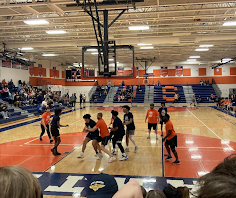Concussions are nothing to play with
Concussions can happen anytime, anywhere, from a minor bump on the head, to a huge hit in any contact sport that literally rattles your brain around the skull.
These injuries can put a major infraction on any athlete’s career, causing them to miss out on important games and practices that help the athlete develop in the sport.
One may ask, what could be more dangerous than the actual concussion itself? The fact that some athletes hide the injury so that they can keep on playing and not miss out on any important games or practices. It put them at an even greater risk for mental health problems later on in life, such as Alzheimer’s disease and amnesia.
“I haven’t hidden one. It’s very bad judgment to do so” said sophomore Isaac Dorman, who played football for both JV and varsity.
“Hiding it only makes it worse, especially if you play with it. If you do, then you’re gonna be out even longer,” said Dorman.
It’s common sense that anybody that would have a concussion takes the proper and necessary steps so that they can go back into play, and to take the proper precautions so that the injury doesn’t happen again, possibly in an even worse way than before.
“The back-to-play progress is a long but necessary one” said Dorman. “It’s not so grueling, but it is boring. The amount of time that you’re there depends on how bad the concussion is,” said Dorman.
A new report conducted by researchers from Boston and Harvard universities shows that 80% of football concussion go unreported, which, again puts the players at even greater risk. It really should be common sense to report these concussions, and keep players out of a greater health risk later on in life. Would you rather sit on the sidelines, watching your friends play in a game or practice, or would you rather risk developing amnesia or dementia later in life?
Look at the case of professional football player Junior Seau, who lastly played for the Patriots in 2009. After his retirement, he had been suffering from depression, mood swings, forgetfulness, and insomnia. Sadly, Seau committed suicide on May 2nd, 2012 with a shot to the chest. It was later on revealed that Seau, along with dozens of other deceased football players, had been suffering from CTE, a condition traced to concussion- related brain damage with depression as a symptom.











![“My dad started me [in golf] when I was four years old and then in about eighth grade, when
COVID-19 started, I started playing competitively,” said varsity golf captain Grace Saunders.](https://theoracleonline.org/wp-content/uploads/2023/11/unnamed-7.png)